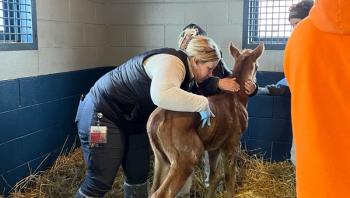
AAVSB, AVMA disband efforts to unite programs
PHILADELPHIA-Two of the nation's top veterinary medical groups are giving up efforts to unite their rival educational equivalency programs for graduates of non-accredited schools.
PHILADELPHIA—Two of the nation's top veterinary medical groups are giving up efforts to unite their rival educational equivalency programs for graduates of non-accredited schools.
According to a joint statement, the decision hinged on the definition of "independent entity." American Veterinary Medical Association (AVMA) and American Association of Veterinary State Boards (AAVSB) representatives apparently could not agree on how to fuse the Educational Commission for Foreign Veterinary Medical Graduates (ECFVG) with the Program for the Assessment of Educational Equivalence (PAVE).
AVMA documents reveal the dissention came down to power and money.
"In AVMA's definition, an independent entity is one governed by an autonomous organization, the operation of which is independent and separate from that of its founding organizations," a July 22 memorandum states. "The AAVSB representatives presented an organizational structure whereby the ECFVG and PAVE would be combined into a single program under the AAVSB umbrella and supported initially by the AVMA with transition plans to be paid for by program revenue."
Behind the scenes
The enmity between AVMA and AAVSB dates back to 1999, when PAVE, in its development, was publicized by AAVSB as the country's improved means of testing graduates from non-accredited schools. Students criticized AVMA's longstanding ECFVG for its big price tag and long waiting list. AAVSB deemed AVMA's involvement with the system as a conflict of interest because the group controls much of the licensure and college accreditation processes.
All the while, AVMA officials pointed to holes in the AAVSB program, focusing on a PAVE factor that allows students to "circumvent the accreditation process" by taking a clinical skills assessment exam prior to graduation instead of after graduation, as the ECFVG requires.
Call for unity
To appease requests by association members to cooperate, AVMA and AAVSB members in 2001, called for the two programs to unite to form an autonomous organization. Although the groups met several times to hash out a joint plan, the efforts were to no avail.
Before the joint announcement in July, Texas officials formally asked AVMA to move forward with the unification process during the group's annual meeting in Philadelphia. AVMA officials responded with an impromptu resolution to improve ECFVG with "unabated and deliberate haste."
"AVMA is going to move ahead with their plans for ECFVG, and we're going to move ahead with our plans for PAVE," AAVSB Executive Director Charlotte Ronan says.
Disappointed
That decision renders years of efforts to unite the programs a waste of time and money, says Ron Allen, AAVSB member and executive director of the Texas Board of Veterinary Medical Examiners.
"What a let down; this issue just died with a whimper," he says regarding the AAVSB, AVMA split on educational equivalency programs. "I believe our program is better than the ECFVG program. I think PAVE will do well and be a good alternative."
Moving ahead
While the ECFVG remains the only nationwide means for testing educational equivalence, PAVE becomes increasingly relevant. At presstime, 14 states incorporated the program into their veterinary practice acts, and Ronan says she's received calls from several other states planning to join. Still, she remains optimistic about uniting both equivalency examinations one day.
"We've hit a roadblock," she says. "AAVSB supports having a single program, its' just that to date, we haven't agreed how that could work. I'm still hopeful. I would say, 'Never say never'. "
Newsletter
From exam room tips to practice management insights, get trusted veterinary news delivered straight to your inbox—subscribe to dvm360.






